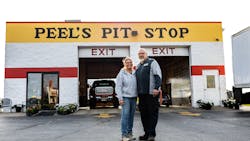At Peel’s Pit Stop in Celina, Ohio, a town just shy of 11,000 residents, owners Barry Jr. and Janice Peel are sort of like grease monkeys with green thumbs.
While Barry spends time on the shop floor and in the pit, Janice works on the company computer, keeping the business in sync. “She does the clean side of the business, and I do the dirty side,” as Barry likes to say. “We are both car people.”
And while Janice loves to ride her motorcycle, Barry gets a kick out of talking to patrons and their kids and letting them see the undersides of their vehicles.
Outside of the couple’s love of cars and those who own them, there’s another interest they share: plants and flowers—so much so that they offer them for sale in a greenhouse behind Peel’s Pit Stop.
Pit Stop Meets Garden Shop
As a boy in a suburb of Detroit, Barry’s family ran an open-air produce business, with one stand positioned directly in front of a quick lube. In the summertime, this is where the young man worked.
“I had to go into the quick lube to go to the bathroom,” he remembers. “And I was intrigued by what was going on inside.”
As he grew, married Janice, and started a family, he thought about buying out his parents’ business, but they didn’t want to sell. And soon he realized: the produce business was seven days a week, anyway, but the quick lube was just five and a half, with holidays off.
Since quick lube had interested Barry since high school-age, he and Janice jumped on the chance to buy one they found sitting empty, repo’d by the bank in the tiny town of Celina.
Then, Barry states, “Dad had extra flowers one year, so he gave them to us to sell, and we put up a greenhouse.”
This was a move that changed everything, and the combo quick-lube-greenhouse concept took off in the rural farming community, ideally positioned with a Menards and a Walmart just across the street.
“It’s a natural draw when people are going to these two stores and they see these nice displays out front of ours, like wagons, straw horses, and a big pile of pumpkins in the yard [all for sale]—it makes you look,” Barry notes.
Add in the fact that the town of Celina is home to a flourishing lake, Grand Lake St. Marys, (which was once the biggest manmade lake in the country before the Hoover Dam was constructed), and the offerings at Peel’s Pit Stop are ideal for the locale.
“Traffic here swells during the summer months, with fishing and boating,” Barry adds, which draws in even more traffic to his business as people take care of their car and pick up some flowers at the same time.
“A lot of people—not just women, guys too—bring the car in and say, ‘I’m gonna go out to the greenhouse real quick,’ and they’re looking for a pepper plant or a tomato plant. So they go out there while they’re waiting for their car.”
Barry notes that he and his team will often finish up with the customer’s car, pull it out front and park it, and it will be 10 minutes before the vehicle’s owner emerges from the greenhouse with their flowers.
Put simply, “It’s cross merchandising,” he states. “And it gives people something to do and something to talk about.”
A Down-To-Earth Business Approach
Just as Peel’s Pit Stop combines two things that simply seem to work together in the compact farming locale, the environment inside the quick lube is fresh and appealing too.
“Everyone today is accustomed to high sales pressure,” Barry notes. But what they’ll find in its place at Peel’s Pit Stop is simple honesty.
From the top down, Peel’s people aren’t trying to sell customers anything.
“We do tire rotations, but we don’t do brakes,” Barry says as an example. “But we check them when people come and we tell them what we find.”
He adds, “Just this morning I told a guy he needed an alignment, and he asked me how I knew. I said he had a tire worn on the outside. Then he said, ‘Do you do it?’ And I said, ‘No, we only do oil changes.’”
Bottom line, Barry says he has no formal sales formula, he just treats customers as though they were his mother. And he passes this on to his staff when he trains them.
“I just hired a new manager, and he came from another quick lube with eight years of experience,” Barry shares, “And [my new manager] said, ‘I’ll have to learn your sales technique.’”
Barry’s response: “Young man, you don’t sell anything here. If it needs it, it does, and if it doesn’t, it doesn’t. Don’t try to upsell. Just pay attention and you’ll get it.”
A few days later, Barry went back to the young man and asked him what he had learned from his observations at the shop. The new manager replied, “Just be honest. If the wiper blade is torn, tell them. And you don’t need to sell it. If the customer says, ‘Then put one on,’ you put one on.”
Barry admits that other business people ask him often about his winning formula for Peel’s Pit Stop’s success, and he freely shares it. “I say be honest with people. Treat people the way you want to be treated. And make sure you’re looking out for their best interests.”
This no-pressure-sales philosophy resonates particularly well with female customers, he finds.
“They say, ‘I’m gonna tell my friends. Your wife is in here and there’s a family atmosphere, and I know if you tell me to pay attention to something, my car really needs it,’” Barry notes, emphasizing, “Treat every customer like they’re your mom.”
Growing Goodwill
To become a fixture in one’s community, Barry advises other quick lube business owners to jump in and make a difference.
“You’ve got to get involved in the community, and every one of them is different,” he notes.
For the Peels, they give back to their tight-knit community of patrons by running the local Emergency Medical Service (EMS) on Monday nights.
“We run the emergency squad and are medical technicians, basic EMTs” he clarifies. “Not paramedics.”
Whatever service a business owner can offer their community, keep in mind, Barry suggests, you’re going to see your local community members time after time over the years, and it’s important to give back to them consistently. “You wouldn’t be here without them,” he reminds.
Another community perk they offer is purely for fun. Barry and Janice have family in the fireworks industry who are licensed to shoot off professional displays. So the couple offers the community two big shows each year, shot off a barge in the lake—which goes off well in a big way.
As kids come through the shop with their families in the days leading up to a fireworks affair, Barry asks them for their favorite color.
“When they say ‘blue’ for instance, I say I’ll shoot a blue shell in the sky with their name on it,” he smiles, “and they love it.”
Then, next time their families come back through Peel’s Pit Stop, the kids will say, “Barry shot off a blue shell for us!”
“I always try to interact with the customer,” the owner shares. “I’ve been working in a family business since I was 12 or 13, and I just have a natural gift for interacting with people.”
A Family Flavor
Like Barry and Janice, their two sons don’t work in the family business—they’re both teachers—but they do help out whenever they’re needed.
In addition, the couple’s oldest granddaughter plies her eye for merchandising and visual displays at Peel’s Pit Stop. And she’s to credit for the eye-catching displays that help get people to pull in, visit the lube shop, and drive home with a trunk-load of plants.
“I took her to Atlanta a few years ago,” Barry says of his granddaughter. When they stopped to get the truck washed, she spotted a greenhouse down the street, and she wanted to look around.
“And she said, ‘Look at that display!’ She’s 13 and she already has a natural eye for building displays and making them look right,” he states.
And of the goods they’ll sell within those displays, Barry notes, “She’ll be like, ‘Can we do them two for something?’ She has been around long enough to see how our minds work—one pumpkin for $3 and two for $5.”
In the end, Barry finds that his granddaughter’s talents help create atmosphere, which, in turn, generates word-of-mouth—and measurably more pit stops.
“Our business increases dramatically, with more traffic flow,” he closes. “It’s natural advertisement.”






